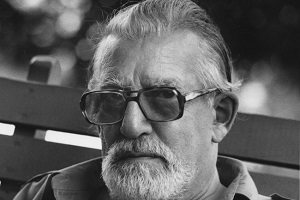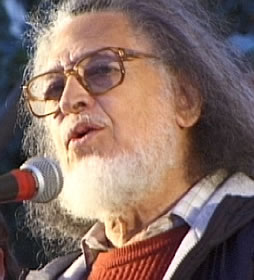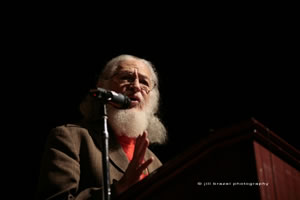De laatste twee dagen was het aantal literaire geboortedagen beperkt. De 28e november is echter een zeer vruchtbare gebleken voor schrijvers. Vandaar dat er na deze posting nog een tweede volgt. Kom gerust nog eens kijken later vandaag…
De Italiaanse schrijver Alberto Moravia werd geboren in Rome op 28 november 1907. Zie ook mijn blog van 28 november 2006.
Uit: Der Dickschädel (Vertaald door Jutta Eckes)
„Eines Morgens im Juli machte ich gerade ein Nickerchen auf der Piazza Melozzo da Forlì, im Schatten der Eukalyptusbäume in der Nähe des ausgetrockneten Brunnens, als zwei Männer und eine Frau auf mich zukamen und mich baten, sie an den Lido di Lavinio zu bringen. Während sie sich überlegten, was sie zahlen wollten, sah ich sie mir genauer an: Blond, groß und dick der eine, ein farbloses, fast graues Gesicht und Augen wie aus himmelblauem Porzellan, die tief in dunklen Höhlen lagen, ein Mann um die Fünfunddreißig; der andere jünger, dunkle, zerzauste Haare, Schildpattbrille, schlaksig, mager, ein Student vielleicht. Die Frau schließlich war geradezu spindeldürr, sie hatte ein langes, schmales Gesicht zwischen zwei Wogen lose herabfallender Haare und wirkte mit ihrem schlanken Körper und dem grünen Kleidchen wie eine Schlange. Doch ihr roter und voller Mund glich einer Frucht, und ihre schönen, schwarzen und leuchtenden Augen waren wie nasse Kohle; sie sah
mich auf eine Weise an, daß ich Lust bekam, mich auf das Geschäft einzulassen. Tatsächlich akzeptierte ich den ersten Preis, den sie mir vorschlugen; darauf stiegen sie ein, der Blonde neben
mir, die beiden anderen hinten, und los ging’s“.
Alberto Moravia (28 november 1907 – 26 september 1990)
De Surinaamse schrijver, dichter en jurist Hugo Pos werd geboren in Paramaribo op 28 november 1913. Pos ging in 1925 naar Nederland om in Leiden en later ook Parijs rechten te studeren. In de oorlogsjaren verbleef hij in Engeland, in Indonesië met zijn ontluikende onafhankelijkheidsstrijd en in Japan ter berechting van oorlogsmisdadigers. Pos was later in Suriname en in Nederland werkzaam als rechter. In zijn naoorlogse, Surinaamse tijd schreef hij onder de schuilnaam Ernesto Albin gedichten in het tijdschrift Soela (1963-1964) en een aantal toneelstukken, onder meer het door hemzelf geregisseerde Vive la Vida (1957). Zijn hoorspel Black and White uit deze tijd werd bekroond. Hij begon pas laat met het schrijven van proza, wel liet hij enkele bibliofiele bundeltjes kwatrijnen het licht zien en verschillende andere bundels. In zijn eerste verhalenbundel Het doosje van Toeti (1985) kijkt hij terug op zijn jeugdjaren in Paramaribo en zijn overtocht naar Holland. De verhalen uit zijn tweede bundel, De ziekte van Anna Printemps (1987) spelen zich overal op de aardbol af. Datzelfde kosmopolitisme is te vinden in de bundel essays en reisverslagen Reizen en stilstaan (1988).
Uit: Creool
„In 1943, terwijl het oorlogsbedrijf nog in volle gang was, gebeurde er iets dat er ogenschijnlijk niets mee te maken had. Meneer Waller, boer Thomas in de wandeling, een oud koffieplanter, had in Paramaribo een Suriname-avond georganiseerd, die uitsluitend voor Surinamers toegankelijk was. Zoiets aparts, exclusiefs, had bij mijn weten in Suriname nog nooit plaatsgevonden. De buitensociëteit Het Park, de geliefde ontmoetingsplaats van de beter gesitueerden, zou op die bewuste avond haar terrein afschermen en alleen Surinamers toelaten. Restte de vraag, Surinamers, wie zijn dat? Om die vraag te beantwoorden dook het eenhoofdig Waller-comité niet in moeilijke antropologische of etnische begripsomschrijvingen, maar liet het aan ieder over om zelf uit te maken of hij/zij er al dan niet toe behoorde. Ik herinner mij die avond nog goed. Op het terrein stonden talrijke tenten waar van alles te doen en te krijgen was, terwijl op de dansvloer een onvermoeibare band voor een opgewekte calypsostemming zorgde. De bezoekers van de fancy-fair, want dat was het, moesten wel diep in hun zak tasten, want achter al dit opgeruimde gedoe school de werkelijke diep-serieuze bedoeling van het Waller-initiatief. De opbrengst van de avond zou dienen om de Surinamer terug te brengen naar de landbouw, die hij na de afschaffing van de slavernij de rug had toegekeerd.
Suriname, de kolonie waarmee volgens Colijn niets mee te beginnen was en waar niets te halen viel, was door de oorlog als het ware uit een diepe slaap ontwaakt. Amerikaanse troepen en een detachement van de Prinses Irenebrigade uit Engeland waren er gelegerd om de voor de oorlog vitale bauxietmijnen te beschermen, waardoor de bedrijvigheid was toegenomen.“
Hugo Pos (28 november 1913 – 11 november 2000)
De Zweedese dichter, schrijver, criticus en reiziger Carl Jonas Love Almqvist werd geboren in Stockholm op 28 november 1793. Almqvist schreeft een groot aantal boeken en gedichten. Hierin verkondigde hij vaak zijn radicale meningen over de maatschappij en politiek. Dit leverde hem veel weerstand op van mensen en instellingen die hem als een gevaarlijke revolutionair beschouwden. Hij werd ervan beschuldigd een vage bedrijfskennis met arsenicum geprobeerd te hebben te vermoorden. Of hij schuldig was is nooit bekend geworden, maar in paniek vluchtte hij naar de Verenigde Staten. Daar nam hij een nieuwe identiteit aan en trouwde. In 1865 keerde hij naar Europa terug. Een jaar later stierf hij in Duitsland het jaar daarna. Hij wordt gezien als één van de belangrijkste Zweedse sociale hervormers van de 19e eeuw.
Uit: Die Woche mit Sara (Vertaald door Anne Storm)
„Das Mädchen sah ihn mit – wie er fand – recht hübschen Augen an. Den Ring, den er ihr hinhielt, nahm sie zwar in der ersten Verblüffung – und er vermutete, sie würde ihn auf den Finger streifen, was sie ursprünglich ja wohl beabsichtigt hatte -, doch dann ging sie, ohne ein Wort zu sagen, langsam zur Reling und warf den Ring ins Wasser. Prosit, Sergeant!, sagte er zu sich selbst, als er diese Bewegung wahrnahm. Das heißt so viel wie: Ich bin ordentlich abgeblitzt. Bravo, Junker!
Er ging an die gegenüberliegende Reling und warf den anderen Rosshaarring, den er sich schon an den Finger gesteckt hatte, auch ins Wasser. Danach spuckte er auf die Salutkanone, die gerade in Reichweite war. Dann spazierte er ein Stück über das Deck nach achtern, und als er sich wieder dem Vorderdeck näherte, geschah es, dass er direkt auf die rosiger Unbekannte stieß, die dort stand und zusah, wie die Maschinerie arbeitete.
“Siehst du”, sagte er und hielt seine Hände hin, “ich habe meinen Ring auch ins Wasser geworfen. Das war das beste, was wir tun konnten.” Erst ein scharfes Mustern von Kopf bis Fuß, dann ein kaum merkliches, doch nicht unfreundliches Lächeln, eine leicht belustigte Miene, die aber sofort verschwand – das war ihre Antwort: “Ist der Ring im Wasser? So, so!”, fügte sie hinzu.
“Siehst du”, sagte er und hielt seine Hände hin, “ich habe meinen Ring auch ins Wasser geworfen. Das war das beste, was wir tun konnten.” Erst ein scharfes Mustern von Kopf bis Fuß, dann ein kaum merkliches, doch nicht unfreundliches Lächeln, eine leicht belustigte Miene, die aber sofort verschwand – das war ihre Antwort: “Ist der Ring im Wasser? So, so!”, fügte sie hinzu.
Carl Jonas Love Almqvist (28 november 1793 – 26 september 1866)
De Australische dichter en schrijver Julian Randolph Stow werd geboren in Geraldton in het westen van Australië op 28 november 1935. Hij volgde een studie aan de University of Western Australia en doceerde daarna Engels aan de University of Adelaide, de University of Western Australia en de University of Leeds. Ook werkte hij als anthropoloog onder de aborginals. Deze ervaringen verwerkte hij in de roman To the Islands, waarmee hij in 1958 de Miles Franklin Award won. Stow woonde ook lang in Suffolk in Engeland. Traditionele verhalen uit de regio verwerkte hij in The Girl Green as Elderflower.
On a Favourite Cat
Your house was a palace, full of arcane nooks
to discover and rediscover; all your life
a long imperialist adventure, where
kingdoms bowed down to your triumphal tail.
How can a little marble dish, abraded
by a rough tongue, so shake the heart? The fall
of sparrows is not man’s concern: I took
no thought of what must leave me for your grave.
Under the mirabelle tree in my godson’s garden,
be earth’s pet now. What can I do?–but wish you
a matriarchy of blackbirds to teach you peaceable manners
and a Malplaquet of a mansion, to stalk and explore for ever.
Julian Randolph Stow (Geraldton, 28 november 1935)
De Canadese schrijver Yves Thériault werd geboren op 28 november 1915 in Quebec. Toen hij 15 was verliet hij de school om te gaan werken. Hij had zeer verschillende baantjes totdat hij als schrijver slaagde. Zijn bekendste werk is Agaguk, een verhaal over culturele conflicten tussen de Inuit en de blanke man uit 1958. In 1975 werd hij wegens zijn verdiensten benoemd tot Officer of the Order of Canada.
Uit: Agaguk
„Dix pas. C’était alors le temps ou jamais. Tout dépendait d’un geste, la pression rapide sur la gâchette, le coup, la balle… L’instant d’une seconde, et moins encore. Un destin fixé. La mort du loup? La mort de l’homme?
Agaguk pressa la détente.
La balle fut un ouragan qui jaillit du canon. Mais elle ne tua pas le loup. Elle ne fit que l’égratigner au passage. Il roula par terre et se retrouva dix pas plus loin. Il fut aussitôt sur ses pattes.
Agaguk était deb
out aussi, son couteau au poing.
Le loup bondit.
Une masse fantomatique, sorte de bolide lancé des airs, s’abattait sur Agaguk. L’homme et la bête basculaient dans le noir. La gueule du loup s’ouvrait, baveuse de rage, et mordait avec un grondement diabolique l’être qui se débattait furieusement entre ses pattes.
C’était entre les deux une lutte horrible, une gymnastique macabre. À chaque gueulée de la bête, le cri de l’homme s’enflait en vrille et crevait la nuit. Le loup en furie l’agrippait, le labourant à grands coups de griffes, puis l’homme saisissant la seconde propice – celle où l’animal s’arc-boutait pour foncer à nouveau – repliait son bras pour plonger le couteau dans le cuir de la bête. Alors celle-ci s’esquivait, mais pour bondir de nouveau sur l’homme qui se raidissait contre la torture.
De grands lambeaux de chair pendaient entre les dents de l’animal.“
Yves Thériault (28 november 1915 – 20 oktober 1983)
De Engelse schrijfster Nancy Mitford werd geboren op 28 november 1904 in Londen. Zij stamde uit een aristocratische familie en was een van de exentrieke Mitford Sisters. Tijdens WO II leerde zij in Londen de Franse politicus Gaston Palewski. Een medewerker van De Gaulle, kennen, wiens minnares zij werd. Mitford schreef biografische werken en vier zeer succesvolle romans: The Pursuit of Love, Love in a Cold Climate, The Blessing en Don’t Tell Alfred.
Uit: The Pursuit of Love
„But why?” I said, for the hundredth time. Linda, Louisa and I were packed into Louisa’s bed, with Bob sitting on the end of it, chatting in whispers. These midnight talks were most strictly forbidden, but it was safer, at Alconleigh, to disobey rules during the early part of the night than at any other time in the twenty-four hours. Uncle Matthew fell asleep practically at the dinner-table. He would then doze in his business-room for an hour or so before dragging himself, in a somnambulist trance, to bed, where he slept the profound sleep of one who has been out of doors all day until cockcrow the following morning, when he became very much awake. This was the time for his never-ending warfare with the housemaids over wood-ash. The rooms at Alconleigh were heated by wood fires, and Uncle Matthew maintained, rightly, that if these were to function properly, all the ash ought to be left in the fireplaces in a great hot smouldering heap. Every housemaid, however, for some reason (an early training with coal fires probably) was bent on removing this ash altogether. When shakings, imprecations, and being pounced out at by Uncle Matthew in his paisley dressing-gown at six a.m., had convinced them that this was really not feasible, they became absolutely determined to remove, by hook or by crook, just a little, a shovelful or so, every morning. I can only suppose they felt that like this they were asserting their personalities.“

Nancy Mitford (28 november 1904 – 30 juni 1973)
De Amerikaanse schrijfster Dawn Powell werd geboren op 28 november 1896 in Mount Gilead, Ohio. Toen zij zeven jaar was stierf haar moeder en vanaf toen leefde zij op verschillende plaatsen bij familie. Na haar schoolopleiding verhuisde zij naar Manhattan. Veel van haar werk zou gaan over het leven in de kleine stadjes vande Midwest of van mensen uit die stadjes die in New York terecht kwamen. Haar roman Whither verscheen in 1925, maar zij zelf gaf altijd She Walks In Beauty uit 1928 als haar debuut aan. In 1942 behaalde zij met A Time to Be Born haar eerste echte succes. In de jaren negentig beleefde haar veelal satirische romans en verhalen door heruitgaves een ware revival.
Uit: Angels on Toast
„The Spinning Top was not one of Chicago’s better spots; its chief charm for its customers was that it was not popular and was no place to take a wife. It was a jolly combination of seedy Hollywood glitter and old-time honkytonk. It was near enough to the station so that a busy man could nip over for a drink and the show between trains, say hello to the girls, maybe, and then, after he missed his train, could even be put up in the little adjoining hotel. The girls were good-natured, not bad-looking graduates of various exclusive burlesque wheels, and they sat around at the bar in little fig-leaf costumes, fluttering their blue-greased eyelids at strangers, and on dull nights at least keeping up a semblance of gayety by their perpetual squeals and chatter. It was said, with authority, that a favored customer could toss his coat to Marie, the hat-check girl, for repairs while he drank, and he could even send her out to do his wife’s shopping, if necessary, while he downed a few at the bar. Homey, that was the way a traveller described the Spinning Top, and it was fine dropping in a place where they didn’t snub you, a place where the waiters all called you by your first name, and the girls kidded and scolded you and took care of you, and took every nickel you had. All right, it was a clip-joint, but if you passed out the manager himself took all your valuables out of your pocket to look after till you came to, so that at least nobody else would steal them. It was your own fault if you forgot next day where you’d been“.

Dawn Powell (28 november 1896 – 14 november 1965)
De Engelse schrijver, dichter en schilder William Blake werd geboren op 28 november 1757 in Londen. Zie ook mijn blog van 28 november 2006.
THE LITTLE BLACK BOY
MY mother bore me in the southern wild,
And I am black, but O, my soul is white!
White as an angel is the English child,
But I am black, as if bereaved of light.
My mother taught me underneath a tree,
And, sitting down before the heat of day,
She took me on her lap and kissèd me,
And, pointing to the East, began to say:
‘Look at the rising sun: there God does live,
And gives His light, and gives His heat away,
And flowers and trees and beasts and men receive
Comfort in morning, joy in the noonday.
‘And we are put on earth a little space,
That we may learn to bear the beams of love;
And these black bodies and this sunburnt face
Are but a cloud, and like a shady grove.
‘For when our souls have learn’d the heat to bear,
The cloud will vanish, we shall hear His voice,
Saying, “Come out from the grove, my love and care,
And round my golden tent like lambs rejoice.”‘
Thus did my mother say, and kissèd me,
And thus I
say to little English boy.
When I from black and he from white cloud free,
And round the tent of God like lambs we joy,
I’ll shade him from the heat till he can bear
To lean in joy upon our Father’s knee;
And then I’ll stand and stroke his silver hair,
And be like him, and he will then love me.
William Blake (28 november 1757 – 12 augustus 1827)

















